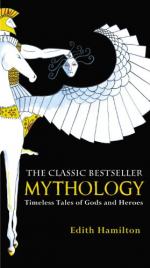|
|
Mythology Part 7: Norse Mythology, Chapter 1
In Asgard, the home of the Norse gods, the gods know that even they will perish someday. Evil will eventually prevail over good. The same is true for men. A brave death entitles them a place in Valhalla, a hall in Asgard where they will celebrate and prepare for the final battle. "This conception of life which underlies the Norse religion is as somber a conception as the mind of man has ever given birth to." Part 7, Chapter 1, pg. 444. Good's power is in resisting evil while facing defeat. A heroic death is a triumph over evil rather than a defeat at the hands of the enemy. The poets recognized that victory and courage were to be found not in life but death. Little mythology survived from this period: Beowulf in England, Nibelungenlied in Germany, and Two Icelandic Eddas: the younger and the elder. The Eddas provide all the religious material from this era. The translations of this material are often awkward and cumbersome.
Signy was the daughter of Volsung and sister of Sigmund. Her husband killed her father and had his sons devoured by wolves. Her husband did not kill her brother Sigmund. She visited her surviving brother in disguise and bore him a son she raised with her other children. He was named Sinfiotl. Together, her brother and son killed the other children and her husband. She entered the burning house and died with them.
The story of Sigard is a similar tale. Brynhild, a Valkyrie, disobeyed Odin and was put to sleep until she would be woken by a man. Sigard went to the house of the Giukungs to see Gunner the king, whose mother wanted Sigard to marry her daughter. Sigard freed Brynhild for Gunner. He took the form of Gunner and disappeared when they returned. Brynhild wanted Sigard dead. Gunner cannot kill him but his younger brother does. Gudrun, the sister, heard of this and told Brynhild the truth, that Sigard was doing a favor for Gunner. Brynhild killed herself and Gudrun weeped. She lamented as she burned the bodies.




